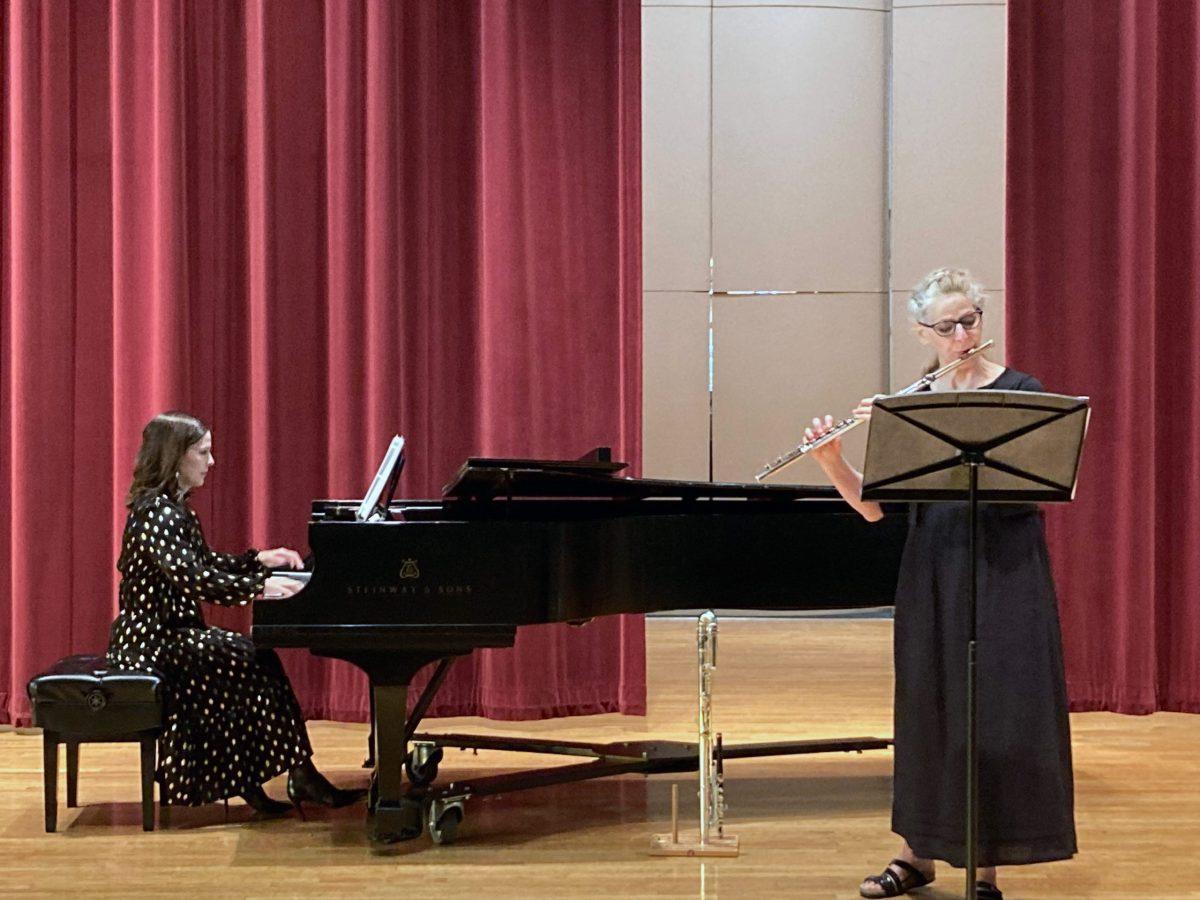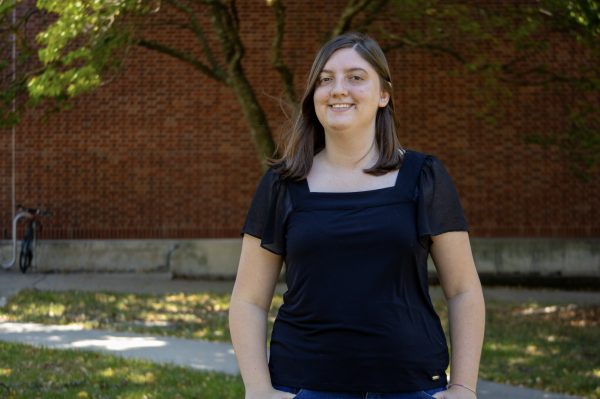*Editor’s Note: We incorrectly reported that Leslie Marrs taught and performed in Boston. As of February 16 that has now been corrected to Baltimore.
On Feb. 4, Leslie Marrs, associate professor of flute and recruitment coordinator for music at Drake, held a faculty recital based around the theme of “The Four Elements.” Staff accompanist Liz Augsburger played piano.
Marrs began playing flute in fifth grade in her school’s band but did not take private lessons until college. While Marrs recommends taking lessons to prevent bad habits from forming, she says that her experiences helped her as a professor.
“I’ve had a lot of students with the same bad habits, so I have at least one way to help people fix their playing,” Marrs said.
Marrs said that going into college she majored in music education intending to become a band director.
“I ended up going to the Eastern Music Festival at Greensboro College in Greensboro, North Carolina. I was sitting in a performance and I was like, ‘You know, that’s what I want to do. I want to play,’” Marrs said.
After changing her major and graduating with a performance major, Marrs played for the U.S. Army Field Band as a featured soloist and freelance taught and performed in Baltimore. Marrs said she fell in love with teaching during this period as an adjunct professor and decided to pursue a doctoral degree. After graduating and taking on more freelancing, Marrs interviewed for a position at Drake.
“The people were super friendly, the students were super friendly. I felt like the music program was very healthy,” Marrs said about the interview process.
Marrs began teaching at Drake in 2006. One of the classes she teaches was originally titled Music Fundamentals, which she changed to Foundations of Music Theory. Marrs is currently planning to write her own text for the class. The course is now designed for non-music majors, focusing on the necessary fundamentals, with a final where students write their own songs.
“I want to have a text that caters to that [non-music majors] — [that] doesn’t get too bogged down in music major-y things, but still gets everything across,” Marrs said.
Marrs is planning to go on sabbatical in the spring of 2025, where she will create a beginner method for flute class that incorporates extended techniques that are appropriate for beginner players. This includes beatboxing and other non-traditional uses of the instrument.
“Now, everybody’s thinking they need to pass a test, and I’m more interested in fostering creativity and helping them explore more,” Marrs said. “And so, the first thing, instead of like, ‘This is how to make a sound,’ it’s like, ‘Here’s the head joint. How do you make sounds on it, how many different ways can you make a sound on the head?’”
Marrs and Augsburger began practicing for the recital in early January.
William Grant Still, also known as the “Dean of Afro-American Composers,” composed the first piece in the recital, titled “Summerland.” The piece is a segment of “Three Visions,” a composition written for his wife about the human soul after death. Still arranged the piece for a multitude of instruments, including flute and piano.
Marrs chose the piece while working out her theme. At first, she had been planning to base the recital entirely around water but then wanted to perform “Summerland” and the recital’s third piece “Phoenix Rising,” which thematically fit earth and fire, respectively.
“I found Summerland for flute and piano and then I was like, ‘That’s perfect,’” Marrs said.
Marrs played “Les Quatre Elements,” composed by Pascal Proust in 2000, next. “Les Quatre Elements” is about all four elements while the third piece, “Vagues Vauges,” is solely about water. The piece, composed by Sophie DuFeutrelle, includes numerous extended techniques for the alto flute.
“Because my expertise is an extended technique, I always have at least 20th-century pieces on every program,” Marrs said.
Stacy Garrop composed “Phoenix Rising,” the final piece in the first half of the concert, based on the one-word prompt of “Phoenix.” Garrop based the piece around the cycle of rebirth. Marrs found the piece perfect to represent fire in the four elements and to showcase extended techniques.
“Most people still think of the flute as a one-note [instrument], like a little birdie. ‘Phoenix Rising’ does not sound like a bird,” Marrs said.
Augsburger, who has played with Marrs in previous recitals, said that her favorite part of concerts tends to be finales.
“I always enjoy the final pieces in a recital, not because it’s over but because it’s your grand finale,” Augsburger said.
The grand finale to the four elements recital was “Sonata (Three Lakes)” composed by Daniel Dorff. The piece includes three sections about different lakes in Dorff’s life.
Marrs hoped that the concert might bring an understanding that “music can communicate from different ways,” from the selection of movements outside of the context of pieces to the extended techniques.
“I hate to tell people what the pieces are about and just let them figure it out for themselves, but it can be nice to allude a little bit to the program, and hopefully it can make people excited if they hear the flute making different sounds,” Marrs said.









Leslie Marrs • Feb 16, 2024 at 8:15 am
Thank you again for this feature, Lily!
For a bit of accuracy, Boston should read “Baltimore.” As much as I love Boston, I’ve never lived there.
TD Webmaster • Feb 16, 2024 at 12:10 pm
Hi Leslie,
I apologzie for the mistake. The article has been corrected. Thank you for bringing this to our attention.